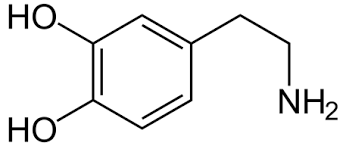- Aeviva
- Posts
- Dopamine: The Brain Chemical That Shapes How We Feel and Act
Dopamine: The Brain Chemical That Shapes How We Feel and Act
Discover how dopamine influences your mood, habits, and even addictions—and natural ways to boost it sustainably.
Ever wonder what makes you feel excited, motivated, or even addicted? It’s all thanks to dopamine, a powerful chemical in your brain that’s often called the “feel-good” neurotransmitter. But dopamine does much more than just make you happy—it drives your habits, shapes your decisions, and even plays a role in addiction.
In this article, we’ll break down how dopamine works, when it’s released, and why keeping it balanced is key to your mental and physical well-being. We’ll also uncover natural supplements and lifestyle habits to help boost dopamine sustainably.
What Is Dopamine and How Does It Work?
Dopamine is a neurotransmitter—a chemical messenger in the brain. It’s involved in regulating mood, motivation, focus, and the reward system.

Dopamine Structure 🧪
💡 How it works: Dopamine is released when you experience something pleasurable or rewarding, like eating your favorite food, achieving a goal, or even receiving a compliment. It reinforces behavior, making you want to repeat it.
Dopamine’s Key Roles:
Helps you stay motivated and productive.
Enhances focus and memory.
Regulates mood and emotions.
Contributes to decision-making.
When Does Dopamine Release?
Dopamine is released in response to rewards or anticipation of rewards.
Triggers for Dopamine Release:
Food: Especially sugar and fatty foods. 🍩
Exercise: Activities like running release dopamine and other endorphins. 🏃
Social Media: Likes, comments, and notifications create small dopamine “hits.” 📱
Success: Achieving a goal triggers a burst of dopamine.
Substances: Alcohol, nicotine, and recreational drugs artificially stimulate dopamine release.
💡 Fun Fact: Dopamine doesn’t just respond to rewards—it’s activated when you expect a reward, which is why anticipation can feel so exciting.
Symptoms of High Dopamine Levels
While dopamine is essential, too much of it can lead to negative consequences.
Signs of High Dopamine:
Restlessness or hyperactivity.
Risk-taking behaviors (e.g., gambling).
Addiction tendencies (e.g., social media, drugs).
Difficulty focusing due to overstimulation.
Dopamine and Addiction: The Problem with Instant Gratification
Activities like gambling, scrolling through TikToks, or playing video games can hijack your brain’s dopamine system, but substances like drugs amplify this effect even further.
💡 Why It’s Addictive: These activities and substances offer instant dopamine surges, overwhelming the brain’s reward system. Over time, this leads to a “dopamine deficit,” where everyday pleasures feel less rewarding, and dependency develops to chase that same high.
Examples of Dopamine-Driven Addictions:
Gambling: The unpredictability of winning creates a powerful dopamine surge.
Social Media: Notifications and likes provide constant micro-rewards.

Reels/TikToks: Quick, engaging content keeps dopamine levels high.
Drugs: Substances like cocaine, methamphetamine, and nicotine are potent dopamine boosters. They flood the brain with dopamine but also damage its ability to produce it naturally.
Cocaine: Blocks dopamine reabsorption, keeping it in the brain for a prolonged euphoric effect.
Methamphetamine: Stimulates massive dopamine release, leading to a rush but quickly depletes reserves, causing intense crashes.
Nicotine: Triggers dopamine release in smaller, repetitive doses, often leading to dependency over time.
The Downside: Drugs and instant-reward activities create a feedback loop that reinforces addictive behaviors. Over time, they desensitize dopamine receptors, meaning the same activity or substance no longer provides the same “high,” pushing individuals to seek higher doses or more extreme behavior.
Natural Ways to Boost Dopamine
Instead of relying on quick fixes, focus on sustainable ways to boost dopamine:
Exercise: Activities like running or swimming naturally increase dopamine and other endorphins.
Eat Dopamine-Rich Foods: Bananas, avocados, nuts, and seeds contain precursors like tyrosine, which helps your body produce dopamine. 🥑
Sleep: Dopamine levels drop with poor sleep. Aim for 7-8 hours per night. 💤
Sunlight: Exposure to natural sunlight increases dopamine production. ☀️
Mindfulness Practices: Activities like meditation and yoga help regulate dopamine and reduce overstimulation. 🧘
Herbal Supplements:
Mucuna Pruriens (Velvet Bean): Rich in L-Dopa, a direct precursor to dopamine.
Ginseng: Known for improving focus and boosting dopamine levels.

Panax Ginseng
Rhodiola Rosea: Reduces stress and enhances dopamine production.
Curcumin: Found in turmeric, it supports dopamine synthesis.
Ginkgo Biloba: Improves blood flow to the brain, aiding neurotransmitter function.
💡 Tip: Always consult a healthcare provider before starting any new supplement, especially if you are on medications.
Did You Know?
💡 Fact: Consistently skipping sleep or relying on artificial dopamine spikes (like social media or gambling) can weaken your brain’s ability to produce dopamine naturally, leading to long-term issues like depression and fatigue.
Dopamine is the driving force behind motivation, reward, and pleasure, but it’s also responsible for addictions and unhealthy habits. Understanding how it works can help you harness its power while avoiding its pitfalls.
Whether through mindful lifestyle changes, natural supplements, or reducing overstimulation, balancing your dopamine levels is essential for a healthier, more productive life. Take care of your dopamine system, and it will take care of you!
Take-Home Message
What It Does: Dopamine regulates mood, motivation, and the reward system.
When It’s Released: Triggered by rewards, success, exercise, social media, and substances.
Addiction: Gambling, TikToks, and other instant-reward activities overstimulate dopamine pathways.
Natural Boosters: Exercise, sleep, sunlight, nutrient-rich foods, and herbal supplements like Mucuna Pruriens and Rhodiola Rosea.
The Goal: Balance is key—overstimulation leads to desensitization, while sustainable habits improve mental and physical health.
Reply